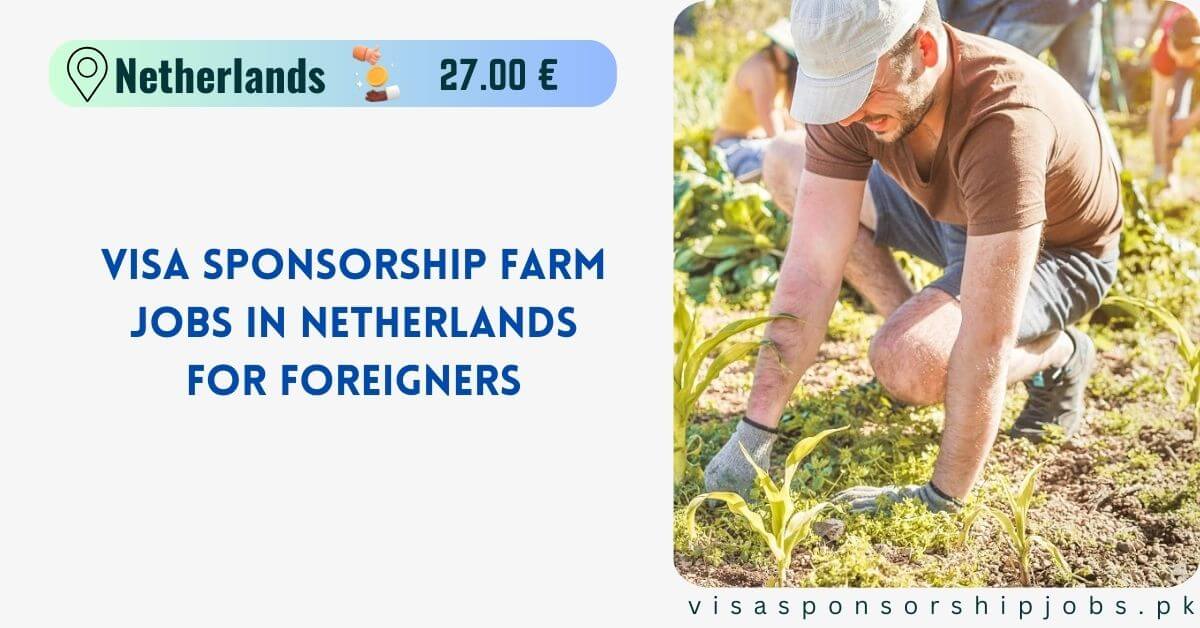Visa Sponsorship Farm Jobs in New Zealand 2025- Apply Now
The unusually high number of individuals it employs and the value it generates are the reasons why agriculture is one of the most significant industries in New Zealand. New Zealand is an ideal destination for individuals who aspire to secure farm employment due to its stunning landscapes, clean air, and diverse farming methods.
The hiring of foreign employees is a simple process on numerous farms in New Zealand, as visa sponsorship is available. This provides individuals from various regions of the world with an equal opportunity to secure employment in New Zealand, allowing them to appreciate the country’s stunning natural environment and diverse culture.
The information provided in this article is comprehensive and covers all available farm occupations in New Zealand.
Check Also: Dairy Assistant Jobs in New Zealand – Visa Sponsorship
Key Points:
- Job Categories: A wide range of farm positions, such as sheep farming, horticulture, dairy farming, and agricultural management.
- Visa Sponsorship: Employers offer assistance with employment visas.
- Work Environment: Working in outdoor environments, near animals or vegetation.
- Job Duration: Permanent and seasonal positions are available.
- Skill Level: Positions ranging from entry-level to skilled, contingent upon the nature of the employment.
- Location: Various regions in New Zealand, including rural and semi-rural areas.
Requirements:
In order to be eligible for farm employment in New Zealand with visa sponsorship, applicants must satisfy specific criteria:
- Work Visa Eligibility: Applicants must be eligible to receive a work visa. Employers typically provide sponsorships to candidates; however, this may only occur after a job offer has been extended.
- Age Limit: Candidates between the ages of 18 and 35 are encouraged to apply for employment opportunities in agricultural industries; however, this requirement may differ depending on the type of carrier and employer.
- Language Proficiency: It is generally advantageous to possess an understanding of English, as communication is essential during the operation of these plantations.
- Physical Fitness: The potential employee must be in excellent health, able to bend and operate various equipment, and strong enough to handle items, as most farm jobs involve physical labor.
Types of Farm Jobs:
New Zealand offers a variety of farm occupations, each with its own set of responsibilities. The following are examples of prevalent farm jobs:
- Dairy Farm Worker: This position encompasses a variety of responsibilities, including the maintenance of machinery and fixtures, the care of animals, the nourishment of cattle, and the alienation of cows.
- Horticultural Worker: These workers are responsible for the planting, harvesting, and maintenance of sustenance crops, such as fruits and vegetables, as well as ornamental crops, such as flowers.
- Sheep Farmer: Responsibilities include the shearing of sheep, the monitoring of their health, and the performance of shepherding duties during the lambing season.
- Crop Management Assistant: Crop reaping, irrigation, sowing, and the removal of undesirable vegetation and crops.
Duties for Visa Sponsorship Farm Jobs:
The duties and assignments associated with various farm jobs may vary depending on the position that is to be filled. Obligations that are frequently encountered include:
- Animal Care: Monitoring the physical condition of livestock animals through grazing, suckering, or milking.
- Crop Maintenance: The process of cultivating, irrigating, competing for culturally significant vegetation, and harvesting crops.
- Equipment Operation: The utilization of a variety of equipment in the agricultural sector, including plowing, sowing, and harvesting.
- Record-Keeping: Records of mechanical servicing, yield on agriculture, and diseases that affect livestock.
- General Maintenance: Responsibilities include the assistance in the maintenance of farm structures, fences, and other facilities and structures.
Salary:
The wages of New Zealand farmers are contingent upon their level of expertise, the location of their workplace, and the nature of their position. The annual compensation that can be anticipated for full-time employees in this type of employment typically range from NZD 45,000 to NZD 60,000. The following are some average salaries for specific roles:
- Dairy Farm Worker: The annual salary ranges from NZD 45,000 to NZD 55,000.
- Horticultural Worker: $40,000 to $50,000 annually in New Zealand dollars
- Sheep farmer: The annual cost will range from NZD 50,000 to NZD 60,000.
- Crop Management Assistant: NZD 40,000 to NZD 50,000 annually
- Aquaculture Worker: annual salary ranging from NZD 45,000 to NZD 55,000
Benefits:
- Simplified Immigration Process: Employers frequently provide assistance with visa applications, thereby simplifying the process for foreign laborers to secure legal employment.
- Competitive Wages: The salaries of farm laborers in New Zealand are generally commensurate with the minimum wage requirements of the country.
- Pathway to Residency: Long-term work visas and even permanent residency options can be obtained through visa sponsorship employment.
- A Wide Array of Employment Opportunities: Opportunities include crop cultivation, livestock management, and fruit harvesting, in addition to dairy farming and fruit picking.
- Accommodation Assistance: Numerous employers offer housing or assistance in locating affordable accommodations in close proximity to the workplace.
- Training and Development: On-the-job training is frequently provided to workers, which improves their agricultural skills and experience.
- Work-Life Balance: The outdoor lifestyle and scenic grandeur of New Zealand are embraced by employees through the implementation of flexible work schedules.
- Cultural Exchange: Opportunities for cultural learning and networking are fostered by working in a diverse environment.
- Healthcare Accessibility: Sponsored laborers may be eligible for New Zealand’s healthcare system, contingent upon their visa classification.
- High Demand for Farm Workers: The agricultural sector is actively recruiting international workers to guarantee consistent job availability and security.
How to Apply for Visa Sponsorship Farm Jobs in New Zealand 2025?
The following steps are typically involved in the application procedure for farm jobs with visa sponsorship:
- Research Job Opportunities: This should commence with an online search for agricultural jobs, such as those available at various job sites, recruitment agencies, companies, or organizations.
- Prepare Your Resume: The process of creating an individual resume that emphasizes the qualifications, skills, and experience relevant to the desired field.
- Job Applications: Submit a motivational letter that demonstrates your qualifications and enthusiasm for the position, while simultaneously applying for multiple positions.
- Job Offer: Upon your success, you will receive a job offer that provides additional information regarding the position, compensation, and whether the company will provide support for your visa application.
Frequently Asked Questions:
How can I apply for a New Zealand farm worker visa?
Before you arrive in New Zealand, you’ll need an offer of employment from a New Zealand Accredited Employer farmer and apply for a work visa through Immigration New Zealand. New Zealand has strict criteria for entry. To work on a dairy farm, you’ll need either relevant experience or recognized qualifications.
What qualifications do I need to be a farmer in NZ?
There are no specific requirements to become a farmer/farm manager. However, employers often prefer that you have qualifications such as: New Zealand Certificate in Agriculture. Diploma in Agriculture.
What activities take place on a farm?
The size of the farm or range determines which tasks farmers and ranchers handle. Those who run small farms or ranges may do all tasks, including harvesting and inspecting the land, growing crops, and raising animals. In addition, they keep records, service machinery, and maintain buildings.












